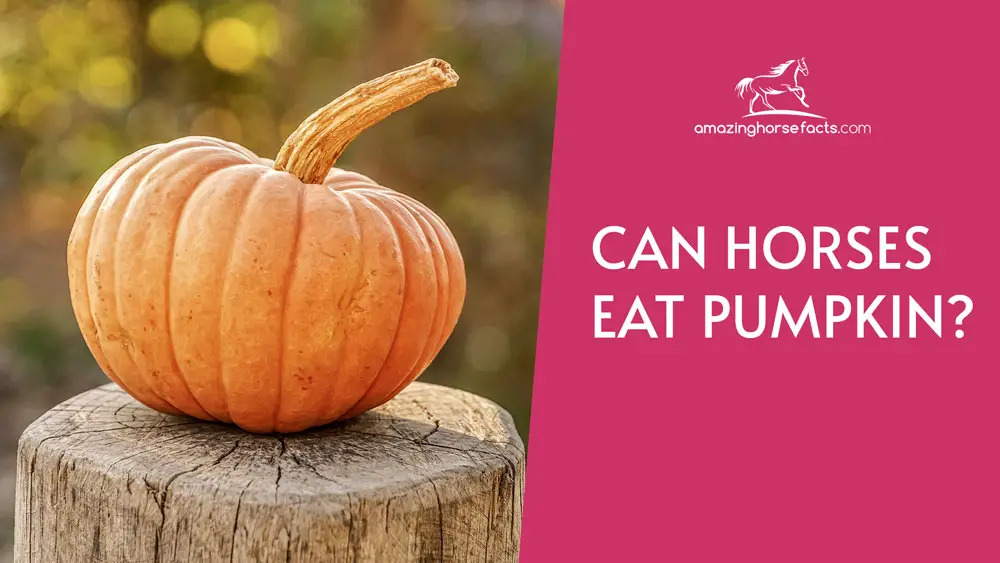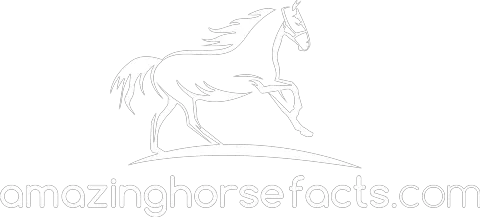Skip To Section

Can horses eat pumpkin? Yes! Pumpkins have many nutrients that are beneficial to horses. However, it matters how much pumpkin you feed your horse, the quantity, the frequency, and other factors like portion size and type.
Pumpkins are plump orange vegetables with essential vitamins, minerals, fiber, and fatty acids that will keep your horse healthy and fight common health problems. The low sugar and high nutrient composition of pumpkins makes them great as healthy snacks. Pumpkins also lack additives and other chemicals present in many pet snacks today. What’s more, pumpkins have a high water content.
Pumpkin seeds are also safe for horses. The seeds are good for both humans and horses. However, when giving horses pumpkin seeds, don’t add any seasoning. The seeds should also be raw.
Benefits Of Pumpkins To Horses
1. Low GL (Glycemic Load) Benefits
You shouldn’t feed your horse anything for the sake of it. Horses and other animals/pets should be fed things with health benefits. It is good practice to find out the nutritional composition of everything you intend on feeding your horses to avoid common problems.
Horses are prone to gastrointestinal irritation and metabolic conditions. The importance of checking the GI (glycemic index) of any food you feed your horse can’t be overlooked. The GI is a simple measurement of how fast something gets digested.
Pumpkins have a GI of 75, which is high. The GL (glycemic load) or probability of a food triggering sporadic blood glucose spikes is 3, which is somewhat low, so horses aren’t likely to suffer blood sugar spikes from eating pumpkin.
2. Fiber Benefits
Pumpkins are rich in fiber known to offer numerous benefits to horses, such as keeping horses full (gut fill). Horses have an enormous gastrointestinal tract that should be kept full. Fiber makes horses full by soaking and holding water in the gut, and horses can use up this water reserve when needed.
It’s worth noting that there is research on why horses aren’t meant to get their main energy from carbs (starch and sugar). Horses have a low enzyme activity in the mouth and small intestines for carbs digestion. Their main energy source is supposed to be VFAs (volatile fatty acids) resulting from fermentation in a horse’s large intestines. The VFAs are then used as energy or transformed into glucose or other molecules.
Horse owners can regulate the amount of energy horses gets from hindgut fermentation using fiber. Pumpkins, among other fiber-rich foods can be used to reduce over-reliance on fermentation for energy.
3. Vitamin A Benefits
Pumpkins are rich sources of Vitamin A, a powerful antioxidant that is proven to boost immunity. Vitamin A also offers horses benefits like supporting vision and reproduction. The vitamin is abundant in fresh grass, but low in hay. Horses store Vitamin A in their liver for use when supplies are low i.e., during winter months.
Giving your horse pumpkin during winter is a great way of maintaining their vitamin A stores. Horses with high vitamin A requirements like pregnant broodmares need pumpkins and other vitamin A-rich foods throughout.
4. Vitamin E Benefits
Like vitamin A, vitamin E is also an antioxidant that boosts a horse’s immunity. Other benefits of vitamin E in horses include supporting muscle function and normal nerve health. Horses need pumpkins and other foods with vitamin E in them because they can’t make vitamin E (synthesize it) in their bodies.
As an antioxidant, vitamin E is important since horses naturally produce free radicals when digesting carbs, fat, and protein. Free radicals aren’t entirely destructive since cells need them to respond. However, too many free radicals cause oxidative stress, which can damage cells and organs like the liver and muscles resulting in health problems like premature aging in horses, among other problems like muscle soreness, slow recovery, and frequent illness.
5. Vitamin C Benefits
Pumpkins are also rich in vitamin C, known to have many benefits to horses. According to research, Vitamin C is an antioxidant (like vitamins A and E). The vitamin’s water solubility makes it better at fighting free radicals in and outside cells. The vitamin also helps in regenerating vitamin E. Notable functions of the vitamin in a horse’s health include collagen synthesis, bone calcification, hormone synthesis, and making calcitriol from vitamin D3.
Since horses suffering from vitamin C deficiency can have depressed immunity, poor hair coat, delayed healing, enlarged adrenal glands, hemorrhage, among other problems, feeding pumpkins will help to deal with these problems.
6. Mineral Benefits
Pumpkins have essential minerals like potassium, magnesium, manganese, copper, and calcium, with notable benefits to horses. Pumpkins can boost the recommended mineral requirements of horses and offer benefits linked to overall health and well-being. Horses need minerals to regulate metabolism effectively, maintain immunity, healthy hooves, fertility, and a healthy shiny hair coat.
7. Fatty Acid Benefits
Pumpkin seeds have omega 3s and 6s proven to boost heart health, reduce inflammation risks and offer many other benefits contributing to good health and wellness in horses.
Risks
Do pumpkins pose any risk to a horse’s health?
As stated above, pumpkins can pose health risks to horses if they are cooked and served with spices, among other ingredients that humans use when preparing pumpkins. Horses should be fed raw pumpkin and pumpkin seeds. The form/type also matters as orange pumpkins are the only type generally safe for horses.
What’s more, the pumpkin should be fresh and clean (free of pesticides and other harmful farming chemicals). Rotten or moldy pumpkin will cause digestive health problems. Pesticides can also cause severe reactions.
Also, the pumpkin should be sliced into small pieces to avoid choking. The stalk should be removed. Large chunks of pumpkin and pumpkin stalks can choke your horse. Pumpkins should also be reserved for healthy horses only. According to studies, horses with illnesses like hyperkalemic periodic paralysis shouldn’t take foods rich in potassium to avoid problems like general muscle weakness.
How To Serve Pumpkin To Horses

There is a bad and good way to feed pumpkins to horses. It all begins in the preparation stage. Before feeding your horse, understand the types of pumpkins and which ones are safe. Orange pumpkins are good for your horse. Some strange types of pumpkins and squashes should be checked first if they are good for horses. Other types can introduce risks like colic, gastrointestinal irritation, and diarrhea.
The freshness of the pumpkin should also be checked thoroughly. As stated before, pumpkins can have rot, mildew, and mold which can cause serious health problems in horses. The pumpkin also needs to be prepared. Soft and saggy parts should be removed if any. Horse owners should also watch out for pumpkins used as decorations. Horses shouldn’t be fed pumpkins with candles, paint, and other non-edible elements.
When feeding, slice the pumpkin into small chunks to avoid choking. You should also introduce pumpkin to your horse slowly. Horses can eat pumpkin alone or when mixed with other food.
Lastly, feed your horse a few pumpkin slices daily. A few cups of pumpkin slices are enough. Pumpkin should be a horse treat as opposed to a substitute meal.
FAQs
Can I Give My Horse Raw Pumpkin?
Yes! In fact, horses should be fed raw pumpkin and pumpkin seeds free of seasoning and other additives put in cooked food.
How Much Pumpkin Can I Give My Horse?
A few small pieces are enough, or one or two cups. What’s more, you should give a slice at a time to avoid choking. As stated above, pumpkin should be a horse treat and not a substitute for a horse’s diet. What’s more, a horse can start misbehaving if they become accustomed to a treat and the treat is withdrawn.
When giving your horse pumpkin slices by hand, feed a slice at a time placed flat at the center of your hand to avoid choking risks.
Are Pumpkins Good For Horses?
Yes! Pumpkins have essential vitamins, minerals, and healthy fats that horses need to stay healthy. Provided pumpkin and pumpkin seeds are fed while taking the right precautions, pumpkins are good for horses.
Are Pumpkins Bad For Horses?
No! But there are risks. Some types of pumpkins may not be 100% safe. Also, it matters how much pumpkin you give your horse at once. Huge chunks will choke your horse. Dirty or rotten pumpkins will also put your horse’s health at risk.
Are Pumpkins Poisonous To Horses?
No! But if they contain pesticides, mold, mildew, or other harmful micro-organisms, pumpkins will definitely compromise your horse’s health. Most importantly, pumpkins aren’t in the ASPCA’s list of poisonous foods for horses.
Can Horses Eat Orange Pumpkins?
Yes! Orange pumpkins are the most popular and safe pumpkins to give horses.
Can Horses Eat White Pumpkins?
Yes! But orange pumpkins are the only pumpkins that haven’t been found to be potentially toxic to horses and causing side effects like diarrhea, colic, and gastrointestinal irritation.
Can Horses Eat Green Pumpkins?
Yes! But it’s advisable to give horses orange pumpkins only given the risks discussed above.
Can Horses Eat Canned Pumpkin?
Yes! But it’s not advisable to feed horses anything that contains preservatives or chemical additives.
Can Horses Eat Pumpkin Seeds?
Yes. Pumpkin seeds are good for horses. However, they should be raw.
Conclusion
Can horses eat pumpkin? Yes. Pumpkins have vitamins, minerals, and Omega fatty acids that are great for a horse’s overall health and wellness. However, horses should be given orange pumpkins as this type is proven to be safe. What’s more, horses should be fed fresh pumpkins free of preservatives. They should also be cut in small chunks to prevent a choking hazard. Provided all precautions are observed, horses can eat pumpkin safely.
Find more on what horses should/shouldn’t eat, among other information on Amazing Horse Facts.

